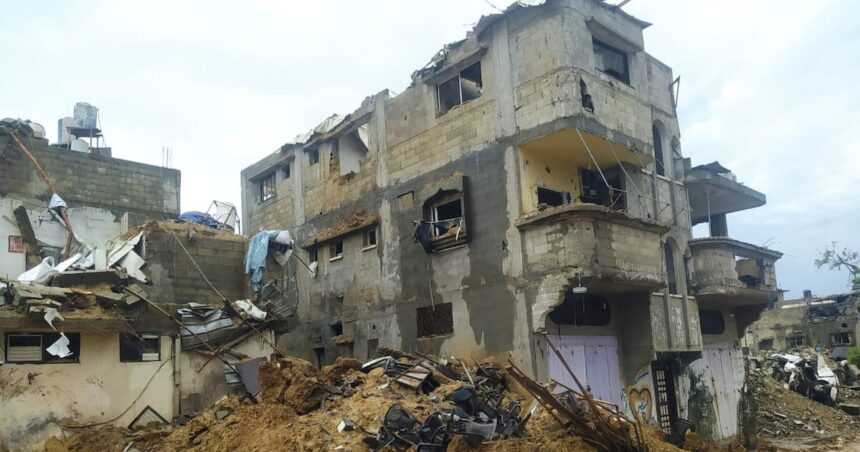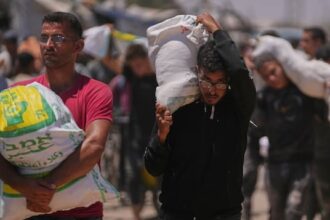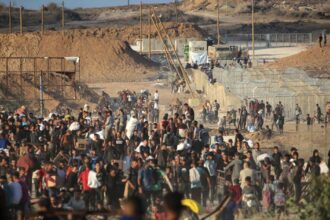In the shadow of relentless airstrikes and amid severe shortages of basic necessities, Canadian citizen Ahmed Al-Madhoun and his family struggle for survival in war-torn Gaza. Their story, one of countless narratives emerging from the Israel-Hamas conflict, offers a rare glimpse into the daily reality faced by civilians caught in the crossfire of geopolitical tensions.
“We need the world to hear us,” Al-Madhoun told CO24 News in a video call punctuated by the distant sounds of bombardment. “Stop the war. Let the aid in. People are dying—not just from bombs, but from lack of medicine, clean water, and food.”
Al-Madhoun, who was visiting family in Gaza with his wife and three children when the conflict erupted on October 7, described their desperate attempts to secure passage back to Canada. Despite holding Canadian passports, they remain trapped, moving between temporary shelters as combat zones shift across the densely populated territory.
“We’ve been displaced seven times in two months,” he explained, his voice breaking. “Each time we think we’ve found somewhere safe, we’re forced to flee again with just the clothes on our backs.”
The family’s ordeal reflects the broader humanitarian crisis engulfing Gaza. According to the United Nations, over 18,000 Palestinians have been killed since the conflict began, with infrastructure devastated and approximately 1.9 million people—nearly 85% of Gaza’s population—internally displaced.
What distinguishes the Al-Madhoun family is their Canadian citizenship, which they had hoped would facilitate their evacuation. Government officials from Canada have confirmed that approximately 150 Canadian citizens and permanent residents remain trapped in Gaza, with diplomatic efforts to secure their passage ongoing but complicated by border closures and security concerns.
“My children haven’t attended school in months. They wake up screaming from nightmares,” Al-Madhoun said. “As a father, the helplessness is crushing. As a Canadian, I feel abandoned.”
Medical professionals working in Gaza’s overwhelmed healthcare system report critical shortages of antibiotics, anesthetics, and surgical supplies. Dr. Sarah Winters, an emergency physician with Doctors Without Borders, told CO24, “We’re performing complex surgeries without proper equipment or pain management. The suffering is immeasurable and largely preventable if humanitarian corridors were consistently maintained.”
The Canadian government has pledged $50 million in humanitarian assistance to civilians affected by the conflict, but critics argue that financial aid without evacuation support for citizens falls short. Opposition leaders have called for more aggressive diplomatic intervention, particularly as winter intensifies the suffering of displaced populations.
International aid agencies continue to press for sustainable humanitarian corridors. The World Food Programme warns that famine conditions are emerging in parts of Gaza, with nearly the entire population facing acute food insecurity.
For the Al-Madhoun family, politics and diplomacy feel distant compared to immediate survival concerns. “Yesterday, we waited eight hours for a small bottle of water,” Al-Madhoun said. “My daughter has developed a rash from not bathing. These are the realities that don’t make headlines.”
As world leaders debate ceasefire terms and strategic objectives, civilians like the Al-Madhouns count days by airstrikes rather than calendar dates. Their story raises uncomfortable questions about citizenship protections during conflict and the international community’s responsibility toward civilians in war zones.
“We just want to come home to Canada,” Al-Madhoun said before our connection was lost to another power outage. “Is that too much to ask for Canadian citizens—to be rescued from a war zone?”
As this conflict continues into its third month with no resolution in sight, one must wonder: how many more families will be torn apart before the international community finds a pathway to peace that prioritizes civilian protection over political objectives?










